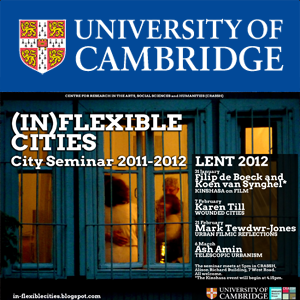City Seminar - 22 November 2011 - How Cities Cope with Obduracy and Vulnerability
Duration: 1 hour 13 mins 18 secs
Share this media item:
Embed this media item:
Embed this media item:
About this item

| Description: |
City planning initiatives and redesign of urban structures often become mired in debate and delay. Despite the fact that cities are considered to be dynamic, innovative and flexible spaces, never finished but always under construction, it is very difficult to change existing urban structures. Cities become fixed, obdurate, securely anchored in their own histories as well as in the histories of their surroundings. Yet, if cities fall victim to a disaster, change of urban structures is sudden, unexpected and often seen as undesirable. At the same time, it is argued that urban disasters can bring about urban innovation and that cities can even benefit from them. The talk will discuss how cities cope with obduracy and vulnerability. Why is it so difficult to bring about urban innovation once urban structures are in place? How do cities respond to urban disasters? How can we explain the ‘rhetoric of innovation’ in cases of urban disaster? These issues will be discussed in relation to theories of obduracy and vulnerability in cities and illustrated with empirical cases.
Anique Hommels is associate professor at the Department of Technology & Society Studies, Maastricht University, the Netherlands. In her PhD thesis she concentrated on the resistance to change (‘obduracy') in urban sociotechnical transformation processes. A book (Unbuilding Cities - Obduracy in Urban Sociotechnical Change (2005). Cambridge, MA: The MIT Press), based on her thesis, has been published by MIT Press in 2005 (paperback edition Fall 2008). In 2003, she was awarded the Brooke Hindle Fellowship from the American Society for the History of Technology (SHOT). After her PhD, her research focus shifted to the problem of vulnerability of sociotechnical systems. She was one of the principle investigators in the ESF/Eurocores project "Europe goes Critical: The emergence and governance of critical transnational European infrastructures" (2007-2009). At the moment, she studies urban disasters and how such critical events generate urban innovation. |
|---|
| Created: | 2011-11-28 09:09 |
|---|---|
| Collection: | City Seminar |
| Publisher: | University of Cambridge |
| Copyright: | Glenn Jobson |
| Language: | eng (English) |
| Distribution: |
World
|
| Keywords: | CRASSH; City Seminar; |
| Explicit content: | No |
Available Formats
| Format | Quality | Bitrate | Size | |||
|---|---|---|---|---|---|---|
| MP3 | 44100 Hz | 125.02 kbits/sec | 67.12 MB | Listen | Download | |
| Audio Interchange File Format (AIFF) | 1.34 Mbits/sec | 740.00 MB | Listen | Download | ||
| Advanced Audio Coding (AAC) | 44100 Hz | 126.39 kbits/sec | 67.86 MB | Listen | Download | |
| Auto * | (Allows browser to choose a format it supports) | |||||

